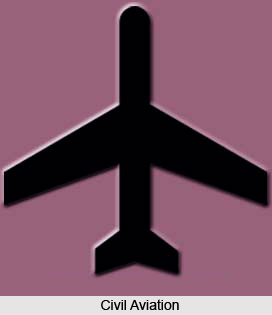 The Ministry of Civil Aviation is the Ministry responsible for policy formulation, development and regulation of the Civil Aviation sector in India. The Ministry also overlooks the planning and implementation of schemes for the growth and expansion of civil air transport, airport facilities, air traffic services and carriage of passengers and goods by air. The Ministry exercises administrative control on various/affiliated autonomous organizations along with CCRS which is responsible for safety in rail travel and operations in terms of the provisions of the Railways Act. It is responsible for the administration of the Aircraft Act, 1934, Aircraft Rules, 1937 and various other legislations pertaining to the aviation sector in the country.
The Ministry of Civil Aviation is the Ministry responsible for policy formulation, development and regulation of the Civil Aviation sector in India. The Ministry also overlooks the planning and implementation of schemes for the growth and expansion of civil air transport, airport facilities, air traffic services and carriage of passengers and goods by air. The Ministry exercises administrative control on various/affiliated autonomous organizations along with CCRS which is responsible for safety in rail travel and operations in terms of the provisions of the Railways Act. It is responsible for the administration of the Aircraft Act, 1934, Aircraft Rules, 1937 and various other legislations pertaining to the aviation sector in the country.
This Ministry exercises administrative control over attached and autonomous organizations like the Directorate General of Civil Aviation, Bureau of Civil Aviation Security and Indira Gandhi Rashtriya Udan Academy and affiliated Public Sector Undertakings like National Aviation Company of India Limited, Airports Authority of India and Pawan Hans Helicopters Limited. The Commission of Railway Safety, which is responsible for safety in rail travel and operations in terms of the provisions of the Railways Act, 1989 also comes under the administrative control of this Ministry.
Attached / Autonomous Organisations of Ministry of Civil Aviation
The Directorate General of Civil Aviation (DGCA) is the regulatory body in the field of Civil Aviation, primarily dealing with safety issues. It is responsible for regulation of air transport services to/from/within India and for enforcement of civil air regulations, air safety, and airworthiness standards. The DGCA also co-ordinates all regulatory functions with the International Civil Aviation Organisation (ICAO).
The Bureau of Civil Aviation Security (BCAS) was initially set up as a Cell in the DGCA in January 1978 on the recommendation of the Pande Committee. The BCAS was reorganized into an independent department under the Ministry of Civil Aviation on 1st April, 1987. The main responsibilities of BCAS include laying down standards and measures with respect to security of civil flights at international and domestic airports in India. It has got four Regional Offices located at International airports i.e. Delhi, Mumbai, Kolkata and Chennai.
The Commission of Railway Safety (CRS), working under the administrative control of the Ministry of Civil Aviation of the Government of India, deals with matters pertaining to safety of rail travel and train operation and is charged with certain statutory functions as laid down in the Railways Act (1989), which are of an inspectorial, investigatory and advisory nature. The Commission functions according to certain rules viz. statutory investigation into accidents rules framed under the Railways Act and executive instructions issued from time to time. The most important duties of the Commission is to ensure that any new Railway line to be opened for passenger traffic should conform to the standards and specifications prescribed by the Ministry of Railways and the new line is safe in all respects for carrying of passenger traffic. This is also applicable to other works such as gauge conversion, doubling of lines and electrification of existing lines. Commission also conducts statutory inquiry into serious train accidents occurring on the Indian Railways and makes recommendations for improving safety on the Railways in India.
The National Aviation Company of India Ltd. (NACIL) was incorporated under the Companies Act 1956 on 30 March 2007 and is owned by the Government of India. The Company was created to facilitate the merger of the two main state-owned airlines in India: Air India, with its subsidiary Air-India Express and Indian Airlines, together with its subsidiary Alliance Air.
The Airports Authority of India (AAI) was formed on 1st April 1995 by merging the International Airports Authority of India and the National Airports Authority with a view to accelerate the integrated development, expansion, and modernization of the operational, terminal and cargo facilities at the airports in the country conforming to international standards terminals.
The Aviation industry in India is one of the fastest growing sectors globally. The sector has undergone rapid transformation since the liberalization drive that began in the earlier half of the decade.




















